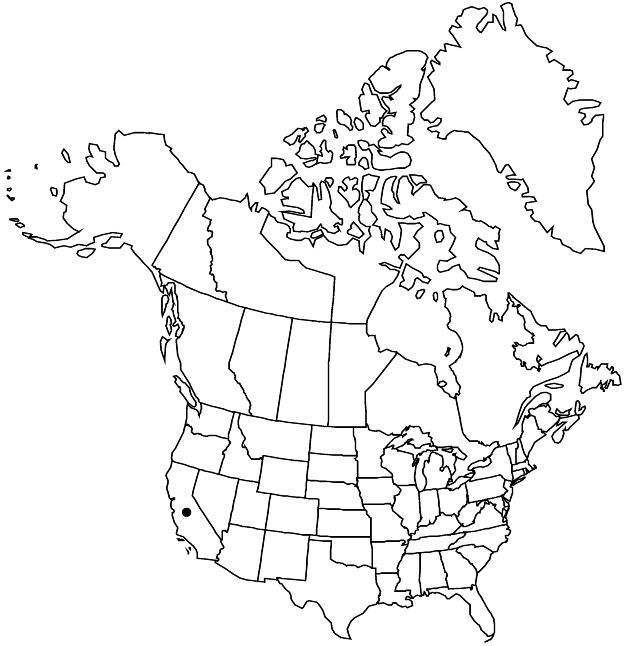Difference between revisions of "Potentilla hickmanii"
Bull. Torrey Bot. Club 29: 77. 1902.
FNA>Volume Importer |
FNA>Volume Importer |
||
| Line 32: | Line 32: | ||
|distribution=Calif. | |distribution=Calif. | ||
|discussion=<p>Of conservation concern.</p><!-- | |discussion=<p>Of conservation concern.</p><!-- | ||
| − | --><p>Potentilla hickmanii is known from only two extant populations in Monterey and San Mateo counties. The species is a federally listed endangered species (U.S. Fish and Wildlife Service, ecos.fws.gov/docs/recovery_plan/050617a.pdf). Plants from Sonoma County formerly included in P. hickmanii now constitute P. uliginosa. Although some morphologic overlap occurs with P. millefolia, P. hickmanii generally differs in having less dissected leaflets occupying less of the leaf axis, as well as somewhat larger flowers bearing fewer carpels.</p> | + | --><p><i>Potentilla hickmanii</i> is known from only two extant populations in Monterey and San Mateo counties. The species is a federally listed endangered species (U.S. Fish and Wildlife Service, ecos.fws.gov/docs/recovery_plan/050617a.pdf). Plants from Sonoma County formerly included in <i>P. hickmanii</i> now constitute <i>P. uliginosa</i>. Although some morphologic overlap occurs with <i>P. millefolia</i>, <i>P. hickmanii</i> generally differs in having less dissected leaflets occupying less of the leaf axis, as well as somewhat larger flowers bearing fewer carpels.</p> |
|tables= | |tables= | ||
|references= | |references= | ||
| Line 56: | Line 56: | ||
|publication year=1902 | |publication year=1902 | ||
|special status=Conservation concern;Endemic | |special status=Conservation concern;Endemic | ||
| − | |source xml=https://jpend@bitbucket.org/aafc-mbb/fna-data-curation.git/src/ | + | |source xml=https://jpend@bitbucket.org/aafc-mbb/fna-data-curation.git/src/8f726806613d60c220dc4493de13607dd3150896/coarse_grained_fna_xml/V9/V9_253.xml |
|subfamily=Rosaceae subfam. Rosoideae | |subfamily=Rosaceae subfam. Rosoideae | ||
|tribe=Rosaceae tribe Potentilleae | |tribe=Rosaceae tribe Potentilleae | ||
Revision as of 19:15, 18 September 2019
Plants ± rosetted; taproots fleshy-thickened. Stems usually prostrate to decumbent, sometimes ± ascending in supporting vegetation, 0.5–2.5 dm, lengths 1–2 times basal leaves. Basal leaves pinnate with distal leaflets ± confluent, 3–17 × 1–3.5 cm; petiole 1–5 cm, straight hairs sparse to common, appressed, 0.5–1.5(–2) mm, stiff, cottony hairs absent, glands absent or sparse; primary lateral leaflets 3–6 per side, on distal 1/2–2/3 of leaf axis, ± overlapping to nearly separate, largest ones cuneate to flabellate, 0.5–2 × 0.5–1.5 cm, distal 1/2 to whole margin ± palmately incised 1/2–2/3(+) to midvein, ultimate teeth or segments 2–5, narrowly elliptic to oblanceolate, 2–10(–15) × (1–)1.5–3 mm, apical tufts 0.5 mm, surfaces green, not glaucous, straight hairs sparse to common (often sparser to glabrate adaxially), appressed, 1–1.5 mm, stiff, cottony hairs absent, glands absent or inconspicuous. Cauline leaves 2. Inflorescences 2–5-flowered, very openly cymose, sometimes racemiform. Pedicels 1–2(–4) cm, ± recurved in fruit. Flowers: epicalyx bractlets ± elliptic, 3.5–6 × (1–)1.5–2.5 mm; hypanthium 3–5 mm diam.; sepals 3.5–7(–9) mm, apex acute; petals 6–12 × 5–9 mm; filaments (1.5–)2–3(–4) mm, anthers 0.7–1.2 mm; carpels (2–)5–15, styles 2.5–3.5 mm. Achenes 2 mm, smooth, ± carunculate.
Phenology: Flowering spring–early summer.
Habitat: Vernally saturated coastal meadows, openings in Monterey Pine forests
Elevation: 30–100 m
Discussion
Of conservation concern.
Potentilla hickmanii is known from only two extant populations in Monterey and San Mateo counties. The species is a federally listed endangered species (U.S. Fish and Wildlife Service, ecos.fws.gov/docs/recovery_plan/050617a.pdf). Plants from Sonoma County formerly included in P. hickmanii now constitute P. uliginosa. Although some morphologic overlap occurs with P. millefolia, P. hickmanii generally differs in having less dissected leaflets occupying less of the leaf axis, as well as somewhat larger flowers bearing fewer carpels.
Selected References
None.
